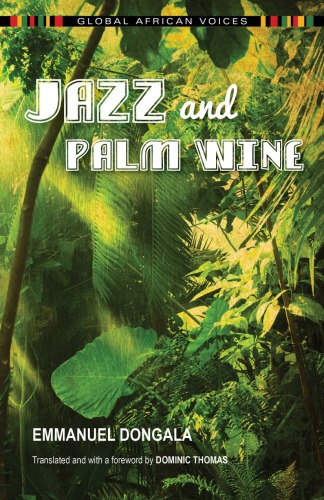
Jazz and Palm Wine
Global African Voices
کتاب های مرتبط
- اطلاعات
- نقد و بررسی
- دیدگاه کاربران
نقد و بررسی

April 4, 2016
Gritty and revealing, Ntshanga’s debut novel offers a brazen portrait of present-day South Africa. Lindanathi tries not to think about his role in the death of his brother, Luthando, 10 years ago. Instead, he’s usually concerned with living day to day, working minimum-wage jobs and selling antiretroviral medication (ARVs) alongside friends Ruan and Cecilia, whom he met at an HIV- and drug-counseling meeting. But the past comes calling in the form of a text message from uncle Bhut’ Vuyo, beckoning Lindanathi to leave Cape Town and return home to the rural district of Dunoon to keep a promise. While contemplating a response to his uncle, Lindanathi and his cohorts get involved with a stranger who offers them more money for their ARVs than they can refuse. This mysterious client further prompts Lindanathi to confront the memory of where he’s been and consider where he’s headed. Ntshanga provides thoughtful commentary on social issues and disparities prevalent in regions of Africa, including the lasting effects of globalization, poverty, and colonialism. The first-person narrative is dark, honest, and compassionate. The realistic voices reflect the outlook of people who cannot think about long-term goals because their immediate circumstances are so dire. This is an eye-opening, ambitious novel.

May 1, 2017
Dongala’s striking story collection, originally published in France in 1982, includes political tales set in his native Congo and jazz-themed pieces set in America. The first story, “The Astonishing and Dialectical Downfall of Comrade Kali Tchikati,” follows one man’s journey from strict Marxist-Leninist materialism to acknowledging the power of fetish magic. “Old Likibi’s Trial” examines the push and pull between the same forces, with the trial’s presiding official, Konimboua Zacharie, made to look especially foolish. “A Day in the Life of Augustine Amaya” and “The Ceremony” both concentrate on the crushing inhumanity of the socialist bureaucracy. Scientific socialism permeates all of the tales set in Africa, each of which is full of Marxist-Leninist jargon. The title piece takes a turn into the science-fictional realm when aliens fall to Earth and are enraptured by jazz and palm wine. The final story, “A Love Supreme,” is a personal meditation in praise of John Coltrane. Dongala’s prose can be quite moving, and his writing full of marvelous, lyrical imagery, as when he describes the evening as “those inchoate and fugitive hours when the daylight begins to fade and darkness gradually spreads its cloak.”

March 15, 2016
A trio of friends sell antiretrovirals to HIV patients in Cape Town, but their lives are upended when a stranger who knows more about them than he should tries to buy their whole stash. It's early in the 21st century, the South African government has not yet made antiretrovirals widely available, and Lindanathi, who contracted HIV while working as a lab assistant, now spends his days hanging out, huffing glue, and, with the help of two friends, Cecelia and Ruan, selling his own ARVs to customers he finds at support-group meetings. One day, the friends receive an email from a man offering to buy all their pills for double their usual price. But the proposition comes with an implicit threat: the man also includes information about where each of them lives and works, and before they even agree to his terms, the stranger has deposited the funds in their bank account. It's an electrifying premise, though Ntshanga is more interested in Lindanathi's emotional journey than with the particulars of the plot. Indeed, a good portion of the proceedings concerns not the present but the past. Ten years before, Lindanathi's younger brother, Luthando, was killed, and Lindanathi blames himself for what happened. As the narrative moves forward, questions build: how exactly did Lindanathi contract HIV? What really happened to Luthando? And who is the stranger at the story's core? Unfortunately the questions Ntshanga raises are more compelling than his answers, but even if the plot doesn't completely come together, he still succeeds at exploring major themes--illness, family, and, most effectively, class--while keeping readers in suspense. Readers hooked by the premise may ultimately find the plotting a disappointment, but Ntshanga's promising debut is both moving and satisfyingly complex.
COPYRIGHT(2016) Kirkus Reviews, ALL RIGHTS RESERVED.

April 15, 2016
Winner of the 2013 PEN International New Voices Award, Ntshanga captures South Africa's dark 1990s through the story of Lindanathi. Convinced that he is responsible for his brother's death, Lindanathi is HIV-positive and rarely employed, spending his days sniffing glue and paint thinner, hanging out with friends Cecilia and Ruan (who says "the damned should stick together"), selling antiretroviral drugs (ARVs) to get by, and generally avoiding his case manager, who wants to see records of his CD4 account. A big offer to buy the friends' surplus supply of ARVs puts Lindanathi at a crossroads. VERDICT Ntshanga offers a devastating story yet tells it with noteworthy glow and flow that keeps pages turning until the glimmer-of-hope ending.
Copyright 2016 Library Journal, LLC Used with permission.

























دیدگاه کاربران